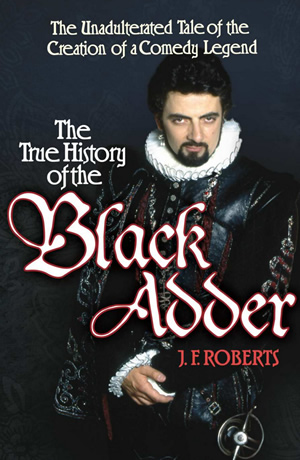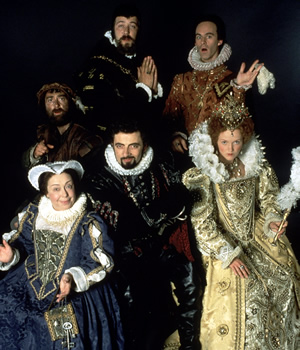Book Review: The True History of the Black Adder

Perhaps no TV comedy has a bigger claim to British sitcom greatness than Blackadder. Spanning nearly five hundred years during its 1983 to 1989 four series run, Blackadder, at its best, saw a level of writing unsurpassed either before or since while delivering some of the great comedic TV performances of the decade. As well as a fair few knob gags.
Things did not begin well though. The first series (The Black Adder), conceived by Rowan Atkinson himself and co-writer Richard Curtis off the back of Atkinson's Not The Nine O'Clock News success, was not a hit. Ask most people what they chiefly remember about the series in general and they will probably remember Blackadder as sarcastic, witty and cunning and Baldrick as a hapless dullard. Yet in the War of the Roses themed first series, the roles are reversed. It is Prince Edmund who is the stupid one - an awkward fusion of the later Edmund and Atkinson's next success Mr Bean - while Baldrick (Tony Robinson), though still amiable, has the smarts.
More importantly The Black Adder lost something important by not being filmed in front of a live audience. Despite memorable turns by a typically over the top Brian Blessed (who, on set, delighted in being as unpredictable and spontaneous as possible as King Richard IV) and Rik Mayall, the whole thing is a bit of a mess.
This book's author, JF Roberts, certainly doesn't sidestep the first series' faults in this history, but nevertheless argues: "it seems highly unlikely, if The Black Adder had remained a stand-alone series that it would be remembered as anything less than a lost classic by lovers of British comedy everywhere." I don't agree.
Thankfully Blackadder (narrowly) escaped being a stand-alone series. Blackadder II was broadcast in early 1986 and moved forward in time to the early Elizabethan era. It is perhaps the best series of any British sitcom ever made.
Partly it's down to the script. For example, the whole premise of the Heads episode (in which Edmund is appointed Lord High Executioner and ends up impersonating a prisoner mistakenly executed) is brilliant. Ben Elton fresh from The Young Ones replaced Atkinson as script writer and though Elton currently seems to rank somewhere below Abu Hamza, Robert Mugabe and George Osborne in popular esteem, his role in this should not be forgotten.
The scripts are a lovely blend of eloquence - Melchett's "As private parts to the Gods are we, they play with us for their sport", Blackadder's "Life without you is like a broken pencil: pointless" - and crudity such as Baldrick's pencil case impression to the simple "How much for a good hard shag?".

It's also the cast in the series. Rik Mayall is astonishingly vibrant in his five minute cameo as Lord Flashheart: "Hey bridesmaid! Like the beard! Gives me something to hang on to!". Miranda Richardson is frankly incredible as Queen Elizabeth I; a performance described as "a strange mix of woman-child-nymphomaniac-tyrant" by co-writer Richard Curtis.
Tom Baker also cameos as the legless Captain Rum (a brilliant performance which he is apparently inexplicably ashamed of). While Blackadder himself achieves the perfect mix of sarcasm ("thank goodness I wore my corset for I fear my sides have split") and deviousness. Although Atkinson himself felt his beard made him look like the Yorkshire Ripper, the rubber-faced comic also reportedly came closer to sex icon status than ever before.
This is not to detract from the brilliance of Blackadder The Third, in which an 18th Century Edmund served the lame-brained Prince George (Hugh Laurie); nor Blackadder Goes Forth, which saw the series at its ratings peak. The fourth series perhaps suffers from an over injection of input from the cast at the read through stage.
By 1989, Stephen Fry, Hugh Laurie and the rest had all achieved success elsewhere and while everyone enjoys lines like: "We're in the stickiest situation since Sticky the Stick Insect got stuck on a sticky bun." There are perhaps too many of them in the final series. But the ending is incredibly poignant. Really it should have been the end but sadly wasn't: Blackadder: Back And Forth, conceived for the Millennium Dome, is widely regretted as a misfire.
JF Roberts is clearly a true Blackadder fan and here delivers what is undoubtedly the definitive history of the series. He is exhaustively thorough not just about the cast (Tony Robinson in particular enjoyed an especially haphazard pre-Blackadder career path), historical context and series itself but is also remarkably thorough on almost everything that influenced the show (The Flashman books, Up Pompeii!) to everything it was later influenced.
Roberts also manages to touch upon almost all of the subsequent work achieved by the high achieving cast of writers and actors, and provides a fascinating summary of the Blackadders that almost were but never happened, including a "lost" script to a Life Of Brian-style Christmas Special that never was. Although I could have done without the brief segments that - as the book's name suggests - pretend the Blackadders were a real historical dynasty (we know they weren't as the rest of the book explains how they came to be made up) this is an almost perfect history of possibly the greatest British sitcom there has ever been.
Help us publish more great content by becoming a BCG Supporter. You'll be backing our mission to champion, celebrate and promote British comedy in all its forms: past, present and future.
We understand times are tough, but if you believe in the power of laughter we'd be honoured to have you join us. Advertising doesn't cover our costs, so every single donation matters and is put to good use. Thank you.
Love comedy? Find out more
